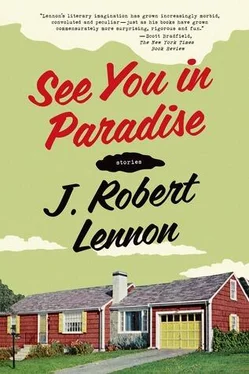I try to talk to Gretchen about it, but she doesn’t want to hear it. “I’m on a different track right now,” she says. “I can’t be distracted from my healing.” “Healing from what? ” I want to know. “My psychic disharmony.” I mean, what can you say to that? Meanwhile, I have no idea where our daughter is half the time, and I haven’t gone up to Chester’s room in three weeks. I can hear him up there, muttering; I can hear the bed squeak as he acts out his violent fantasies; I hear the menacing orchestral strings and explosions and tortured screams that emanate from his favorite games.
Problems don’t just go away, you know? Problems get bigger and bigger and before you know it they’re bigger than you are, and it’s too late to fix them. Some days, when I’ve gotten a decent night’s sleep and have had a few cups of coffee, I think sure, I’ll just get on the phone, start calling people up and asking for help. A school guidance counselor, a marriage therapist, a pediatrician, a witch or shaman or wizard or physicist or whoever in the hell might know what to do about the portal, or even have the balls to walk down that path and see what’s become of the clearing.
But on other days, days like today, when I’m too damned tired even to reach for the phone, the only emotion I can summon up is longing, for a time when the world was miraculous, when I couldn’t wait to get up in the morning and start living.
I mean, the magic has to come from someplace, right? It’s out there, bestowing itself on somebody else’s wife, somebody else’s kids, somebody else’s life. All I want is to get just a little of it back. Is that so much to ask?
In the sunblasted park, at the water’s edge, a titan willow shades a circle of grass and lake. Beneath it the children can be seen wearing red tee shirts, white sneakers, and tan shorts. There are about twenty-five of them, from four years old to fourteen. A few brave the heat with a soccer ball; most are engaged in a game that seems to involve keeping a bunch of beanbags in the air. The grass is dead: it’s late June and there hasn’t been a day of rain in three weeks. Edward and Alison are watching from their car.
Edward is thinking that, from here, they all look pretty good. Scrubbed and uniformed, the children glance from time to time at the organizers grilling meat nearby, setting out foil-covered plates on a folding buffet table. The sight gives Edward a magnanimous, fatherly feeling. He thinks he’d better keep this feeling in check: You don’t go hungry to the grocer’s, he likes to say.
Alison is thinking: I don’t want a white one. I don’t want to be one of those people who has to have the right kind. Give me a black one or a Chinese one or something, they’re all kids, they’ve all got good hearts, it doesn’t matter.
Neither gets out of the car. Edward says, “Couldn’t have picked a nicer day.”
Alison sighs. “The grass,” she says.
Then they notice the other couples. How could they have missed them? They’re so conspicuous, each standing alone, far, far from the other couples, all of them perfectly still, watching. They’re clean, neat, studiously casual: belted shorts and golf shirts for the men, sundresses and summer hats for the women: exactly the way Edward and Alison are dressed.
The children don’t seem to notice. Some have been passed over a hundred times. Some have no hope at all, Alison is thinking, but they’ve come anyway, just in case. They’re playing, just like normal children. They are normal children, she reminds herself.
“There,” Edward says, pointing. A couple is making its move, heading for a spot beneath the willow where three children are playing a board game on the grass. As they approach, the man and woman bend over, readying themselves to speak. One child, a black-haired, dark-skinned boy, looks up.
The couple is intercepted by an organizer.
“Whoops,” says Edward.
The organizers are wearing white tee shirts with an insignia on the breast. This organizer, a plump, youngish woman, has her hand stuck straight out to be shaken. The man and woman right themselves to clasp it. They are led to a buffet table and given name tags. The black-haired boy watches until he’s handed the dice. Then he turns back to his game. The woman, narrow-faced, wan, thin-haired, continues to stare at the boy until her husband pulls her away.
“I can’t do this,” says Alison.
“It’s a walk in the park,” Edward tells her, then realizes the unintended joke and says, very loudly, “Ha!”
He gets out of the car; she follows.

The head organizer is named Greta. Edward misses the name when she introduces herself and ends up having to lean close to read her name tag. But not too close; he doesn’t want her to think he’s checking out her boobs, though of course he is. Consequently he reads it as “Great.” Can that be right? She is tall and unbalanced, like a stack of colorful wooden blocks.
“I am simply thrilled to see you all here today,” says Great. She has herded the couples onto a patch of grass that is burdened by direct sun, where they have been asked to sit. Behind them the children play, stealing glances. “A few guidelines. One, we have brought no forms to fill out, nothing like that. Today is just for kicks. If you hit it off with a particular child, let us know, and we can arrange a meeting. Two, don’t talk about why you’re here, please. The children already know, and they are a little nervous! So talk about something else — doggies, sports, airplanes, church.”
Edward begins thinking about how he might incorporate all these subjects into a single sentence.
Alison thinks that the other couples look better qualified, wealthier, tougher than she and Edward. They probably have connections: she always believes all other people know one another. What if our child turns out to be religious? she wonders. A Baha’i? A Jain? There would be time to get books out of the library.
“And third, and this is most important, please: do not, under any circumstances, ask a child if he or she wants to come home with you, okay? Okay! Terrific!” Great claps her hands. The couples stand up.

Edward heads straight for the tallest child, an ugly, pale boy with stretched features: a long nose; narrow, slanted, almost Asian eyes; a pointed chin. He is sitting in the shade watching the other kids. Edward sits beside him.
“You don’t want me, man,” the kid says.
“Thanks for the tip,” Edward tells him, and the kid looks surprised. “Why, what’s wrong with you?”
“My folks were no good. Also people tried me out before and it didn’t work.”
“You were bad?”
The kid laughs. “Uh-huh.”
“What’d you do?”
“Smoked weed.”
“Mmm,” says Edward.
“I never did it before. Their freakin’ real son gave it to me, except they didn’t believe me when I told them.”
Edward reads the kid’s name tag in an ironic, obvious way. Nate. “Oh, I believe that. Kids have no boundaries, Nate.”
Nate stares at Edward for a moment. He says, “What’s your name?”
“Ed.”
“Do you let kids call you Ed or do they have to call you Mister something?”
“It’s just Ed,” Edward says. “Like Cher.”
Edward thinks maybe he’s gone too far. Nate is squinting at him like he’s mad.
“Like who?” Nate says.

Alison watches Edward take off alone and feels sick to her stomach. They’re in this together, she thinks. But she imagines what Edward would tell her if she said so: “We can cover more ground split up,” he’d say, as if it were a scavenger hunt. And then she hears him say, “It is a scavenger hunt, Al.” He calls her Al. Most of her boyfriends called her Allie, and the worst of them, a long-lashed pec-pumper named Lou, called her Alison, as if this formalized respect would fool her. Edward calls her Al and she calls him Edward. That happened on the first date. Al and Edward: it went through her head all night long. Then they got married and tried to have a kid for nine years. She didn’t want the drugs; she was afraid of octuplets, and then what? Aborting some, but not others: that wasn’t for her, it seemed so arbitrary. What if they killed the wrong ones? So adoption is it. It’s the right thing to do. They read about the picnic in the paper.
Читать дальше













